In this delicately cracked comedy from Miranda July (Me and You and Everyone We Know) a 30-something LA couple give up their jobs for a last taste of freedom – before adopting a cat. “Surreal, precious, devastating and brilliant.” — The Playlist

Rich and fascinating... The Future is surreal, precious, devastating and brilliant.
Screened as part of NZIFF 2011
The Future 2011
Stranger, bolder and more concentrated than her Me and You and Everyone We Know, Miranda July’s second feature has a delicate, cracked demeanour all of its own. It’s not exactly a romantic comedy, but it’s all about love and it’s often funny. It’s not exactly satire, but it gently mocks its hopelessly self-conscious protagonists – and it is narrated by an invalid cat.
Fretting about underachievement and impending decrepitude – ‘We’re 35 now… and 40 might as well be 50.’ – Sophie (July) and Jason (Hamish Linklater) decide to commit: they are going to adopt that cat. In the 30 days before Paw Paw is released from quarantine they will explore what’s left of their freedom. Quitting their jobs as dance instructor and IT-support desk staffer, the two drift in disconcertingly different directions. Sliding from perilously cute whimsy into bewitching suburban magic realism, July creates an unsettling, surreal comedy about immobility, the narrowing of options, and the small crucial differences between being alone together and alone apart. Comparisons with husband Mike Mills’ Beginners, elsewhere on the programme, are irresistible. — BG
“The Future works wonders when July takes her intentions to their stylistic extremes. With a delectable Jon Brion soundtrack guiding the proceedings, the movie adopts a familiar bittersweetness, but otherwise takes on a highly original tone… It primarily succeeds by leaving its metaphoric content open-ended, arguing that the only thing determinable about the future is that it exists entirely within the minds those willing to imagine it.” — Eric Kohn, indieWIRE